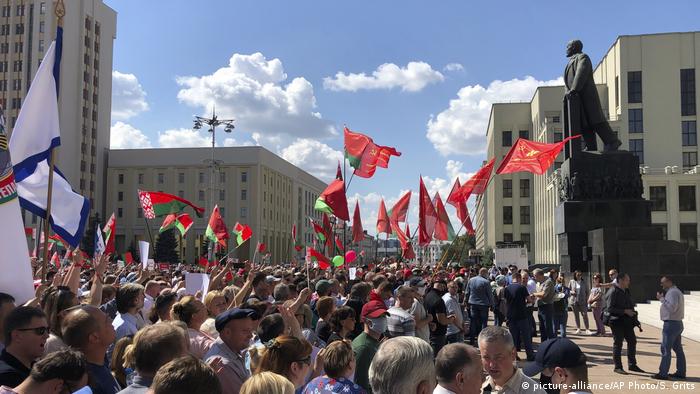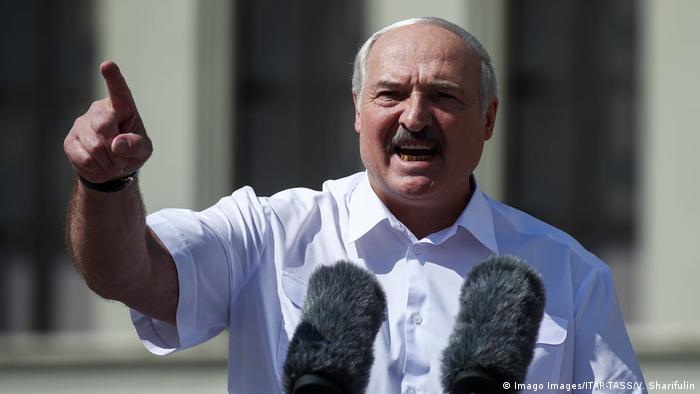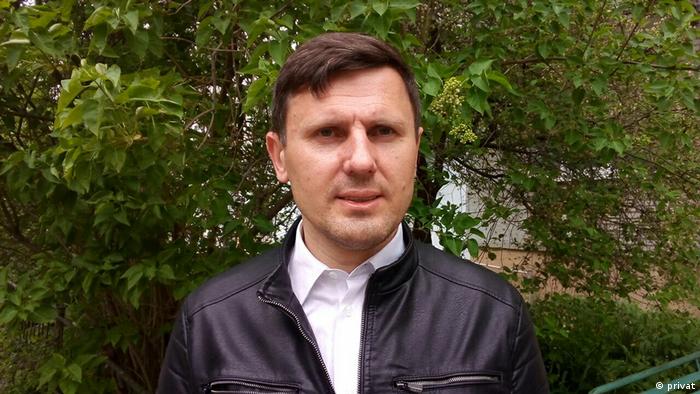Belarus leader says Russia willing to help counter protests
Partner of dead Belarus protester believes police shot him
PHOTOS AT END
By YURAS KARMANU

1 of 19 https://apnews.com/9ba6d114f9aa91680e48fbca2fec14b9
A woman cries holding a poster showing a photo of a protester beaten by police in a hospital, during a rally in Minsk, Belarus, Saturday, Aug. 15, 2020. Thousands of demonstrators have gathered at the spot in Belarus' capital where a protester died in clashes with police, calling for authoritarian President Alexander Lukashenko to resign.
(AP Photo/Dmitri Lovetsky)
MINSK, Belarus (AP) — Thousands of demonstrators in Belarus took to the streets again Saturday to demand that the country’s authoritarian leader resign after a presidential vote they called fraudulent. In response, the president declared that Russian leader Vladimir Putin had agreed to provide security assistance to restore order if Belarus requested it.
President Alexander Lukashenko spoke Saturday evening several hours after a phone call with Putin as he struggled to counter the biggest challenge yet to his 26 years in power.
Saturday was the seventh consecutive day of large protests against the results of the country’s Aug. 9 presidential election in which election officials claimed the 65-year-old Lukashenko won a sixth term in a landslide. Opposition supporters believe the election figures were manipulated and say protesters have been beaten mercilessly by police since the vote.
Harsh police crackdowns against the protesters, including the detention of some 7,000 people, have not quashed the most sustained anti-government movement since Lukashenko took power in 1994.
The demonstrators rallied Saturday at the spot in the capital of Minsk where a protester died this week in clashes with police. Some male protesters pulled off their shirts to show bruises they said came from police beatings. Others carried pictures of loved ones beaten so badly they could not attend the rally.
Luksahenko did not specify what sort of assistance Russia would be willing to provide. But he said “when it comes to the military component, we have an agreement with the Russian Federation,” referring to a mutual support deal the two former Soviet republics signed back in the 1990s.
“These are the moments that fit this agreement,” he added.
Both the European Union and the U.S. government say the presidential election in Belarus was flawed.
Lukashenkov’s main opponent in the vote, Sviatlana Tsikhanouskaya, fled to Lithuania the day after the election, knowing that several previous presidential challengers have been jailed for years on charges that supporters say were trumped up. Other potential challengers, blocked by election officials from running, fled the country before the vote.
A funeral was held Saturday for Alexander Taraikovsky, a 34-year-old protester who died Monday in the capital of Minsk under disputed circumstances. Belarusian police said he died when an explosive device he intended to throw at police blew up in his
But his partner, Elena German, told The Associated Press that when she saw his body in a morgue on Friday, his hands showed no damage and he had a perforation in his chest that she believes is a bullet wound.
Hundreds of people came to pay their last respects to Taraikovsky, who lay in an open casket. As the coffin was carried out, many dropped to one knee, weeping and exclaiming “Long live Belarus!”
Video shot by an Associated Press journalist on Monday shows Taraikovsky with a bloodied shirt before collapsing on the ground. Several police are seen nearby and some walk over to where Taraikovsky is lying on the street and stand around him.
The video does not show why he fell to the ground or how his shirt became bloodied, but it also does not show that he had an explosive device that blew up in his hand as the government has said.
About 5,000 demonstrators gathered Saturday in the area where Taraikovsky died. They laid a mass of flowers in tribute, piling into a mound about 1.5 meters (5 feet) tall, as passing cars blared their horns.
“It’s awful to live in a country where you can be killed at a peaceful protest. I will leave, if power isn’t changed,” said 30-year-old demonstrator Artem Kushner.
Earlier, the 65-year-old Lukashenko on Saturday rejected suggestions that foreign mediators become involved in trying to resolve the country’s political crisis.
“Listen — we have a normal country, founded on a constitution. We don’t need any foreign government, any sort of mediators, ” Lukashenko said at a meeting with Defense Ministry officials. He appeared to be referring to an offer from the leaders of Poland, Lithuania, Latvia and Estonia to help resolve the politcal crisis in Belarus, a nation of 9.5 million people.
But he did discuss the situation in a call Saturday with Putin, the first publicly known direct contact between the two leaders since the election. A Kremlin statement said Putin and Lukashenko both expressed hope for a quick resolution to the tensions.
“It is important that these problems are not used by destructive forces aimed at causing injury to the cooperation of the two countries in the framework of the union state,” the Kremlin said.
Russia and Belarus reached an agreement in 1997 about closer ties between the neighboring ex-Soviet countries in a union that stopped short of a full merger, although that has collided with recent disputes between the countries and Lukashenko’s suspicions that Putin’s government wants to absorb Belarus.
Protests about the political crisis in Belarus were also held Saturday in the Czech Republic and in front of the Belarusian Embassy in Moscow.
The brutal suppression of protests in Belarus has drawn harsh criticism in the West. European Union foreign ministers said Friday that they rejected the election results in Belarus and began drawing up a list of officials in Belarus who could face sanctions over their role in the crackdown on protesters.
U.S. Secretary of State Mike Pompeo said Saturday that he was glad to see that some protesters in Belarus had been freed but that it was not enough. He also said the presidential election in Belarus fell short of democratic standards.
“We’ve said the elections themselves (in Belarus) weren’t free. I’ve spent the last days consulting with our European partners,” he said Saturday at a news conference in Warsaw with his Polish counterpart.
“Our common objective is to support the Belarusian people. These people are demanding the same things that every human being wants,” Pompeo said. “We urged the leadership to broaden the circle to engage with civil society.”
—-
Jim Heintz in Moscow and Matthew Lee in Warsaw contributed contributed to this story.
Partner of dead Belarus protester believes police shot him
By YURAS KARMANAU

1 of 10 https://apnews.com/8631b22e4a341adf3528106b892ca0e1
Elena German reacts as she speaks during her interview with the Associated Press in Minsk, Belarus, Saturday, Aug. 15, 2020. Alexander Taraikovsky's life-partner Elena German told The Associated Press on Saturday that she is sure her 34-year-old mate was shot by police. German spoke a few hours before Taraikovsky's funeral and burial, an event that could reinforce the anger of demonstrators who for the past have protested what they consider a sham presidential election and the violent police response to their protests. (AP Photo/Mstyslav Chernov)
MINSK, Belarus (AP) — The partner of a man who died in the protests engulfing Belarus says she does not believe the official account that Alexander Taraikovsky was killed when an explosive device that he intended to throw at police blew up in his hand.
Elena German told The Associated Press on Saturday that she is sure her 34-year-old partner was shot by police.
German spoke a few hours before Taraikovsky’s funeral and burial, an event that could reinforce the anger of demonstrators who have protested what they consider a sham presidential election and the violent police crackdown on opposition.
Taraikovsky died Monday as protests roiled the streets of Minsk, the capital, denouncing official figures that showed authoritarian President Alexander Lukashenko, in power since 1994, had won a sixth term in office.
German was able to visit the morgue and see his body on Friday, four days after he died. She said she did not believe he had been holding an explosive.
“There is a seam in the chest area — the hole was sewn up, but there is a black bruise; it’s small but we noticed. His hands and feet are completely intact, there are not even bruises, ”she said.
“Obviously, it was a shot right in the chest,” she said.
Video shot by an Associated Press journalist on Monday shows Taraikovsky with a bloodied shirt before collapsing on the ground. Several police are seen nearby and some walk over to where Taraikovsky is lying on the street and stand around him.
The video does not show why he fell to the ground or how his shirt became bloodied, but it also does not show that he had an explosive device that blew up in his hand, as the government has said.
Belarus’ Interior Ministry has declined to comment on the situation, beyond its initial claim that a protester died because of a hand-held explosive.
German said she intends to seek a full investigation. She has called on a Belarusian human rights organization for help, and wants international experts to take part in a probe.
“I am feeling outraged. I’m angry. That is why I want to achieve justice, ”she said. “In fact, I am very scared,” she added. “I was left alone, without support. I feel empty.”
About 500 people came to pay last respects to Taraikovsky, who lay in an open casket. As the coffin was carried out, many dropped to one knee, weeping and exclaiming “ Long live Belarus!”
German said Taraikovsky had worked hard at his automobile repair business and that neither of them had been interested in politics until the Aug. 9 presidential election.
The family’s views began to change after she and her husband attended a 60,000-strong campaign rally for the main opposition candidate, Sviatlana Tsikhanouskaya, a former teacher and the wife of a jailed blogger. Then they decided to support the post-election protests.
“He was very indignant at the illegal detentions and was proud of the people. He said — ‘Finally, finally!’ We discussed all the news every evening,” she said.
“No matter how hard they try to put up some kind of barriers, turn off the Internet, disperse these rallies, we are not fools — everyone understands everything,” German said.
Later Saturday, thousands rallied at the site where Taraikovsky died in Minsk, demanding that Lukashenko resign, with some protesters showing bruises they said were due to police beatings. The authoritarian leader himself said Russian President Vladimir Putin had agreed to help provide security to counter the protests in Belarus if he asked for such help.
—-
Jim Heintz in Moscow contributed to this story.
PHOTOS
People wave flowers at the farewell hall during the funeral of Alexander Taraikovsky who died amid clashes protesting the election results, in Minsk, Belarus, Saturday, Aug. 15, 2020. Taraikovsky died Monday as demonstrators roiled the streets of the capital Minsk, denouncing official figures showing that authoritarian President Alexander Lukashenko, in power since 1994, had won a sixth term in office. (AP Photo/Sergei Grits)
People with old Belarusian National flags lay flowers as they gather at the place where Alexander Taraikovsky died amid the clashes protesting the election results, during his civil funeral in Minsk, Belarus, Saturday, Aug. 15, 2020. Taraikovsky died Monday as demonstrators roiled the streets of the capital Minsk, denouncing official figures showing that authoritarian President Alexander Lukashenko, in power since 1994, had won a sixth term in office. (AP Photo/Dmitri Lovetsky)
This image taken from the Associated Press Television footage filmed on Monday, Aug. 10, 2020, shows a protester recognized as Alexander Taraikovsky with a wound during a rally after the Belarusian presidential election in Minsk, Belarus, Sunday, Aug. 9. An Associated Press cameraman on Monday recorded a protester falling and then lying still. German viewed the video and confidently said it was Taraikovsky. (AP Photo/Mstyslav Chernov)
Elena German, life partner of Alexander Taraikovsky who died amid the clashes protesting the election results, and his relatives mourn during his funeral in Minsk, Belarus, Saturday, Aug. 15, 2020. Taraikovsky died Monday as demonstrators roiled the streets of the capital Minsk, denouncing official figures showing that authoritarian President Alexander Lukashenko, in power since 1994, had won a sixth term in office. (AP Photo/Sergei Grits)
Mother of Alexander Taraikovsky, who died amid clashes protesting the election results, cries at the coffin during his funeral in Minsk, Belarus, Saturday, Aug. 15, 2020. Taraikovsky died Monday as demonstrators roiled the streets of the capital Minsk, denouncing official figures showing that authoritarian President Alexander Lukashenko, in power since 1994, had won a sixth term in office. (AP Photo/Sergei Grits)
People hold pictures of a protesters beaten by police during a rally in Minsk, Belarus, Saturday, Aug. 15, 2020. Thousands of demonstrators have gathered at the spot in Belarus' capital where a protester died in clashes with police, calling for authoritarian President Alexander Lukashenko to resign. (AP Photo/Dmitri Lovetsky)
Demonstrators shout slogans as hundreds of people, among them many Belarusians, march in support of Belarusian demonstrators facing a brutal crackdown from the government of President Alexander Lukashenko near the Prague Castle in Prague, Czech Republic, Saturday, Aug. 15, 2020. (AP Photo/Petr David Josek)


















































